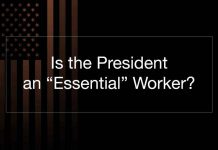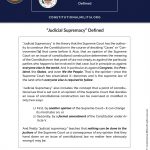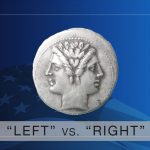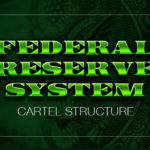Last Updated on January 19, 2021 by Constitutional Militia
Mark Twain reputedly quipped that, although History does not repeat itself, it often rhymes. Such is surely the situation today. Everything that transpires within the Disgrace of Columbia seems in an uncanny manner to echo what transpired during the late 1930s—albeit in Germany, not the United States.
In particular, Americans are now confronted with the possibility that Mr. Obama, as the putative “President of the United States” and “Commander in Chief”, may seek the authorization or other approval of Congress for an order directing American Armed Forces to launch some kind of attack against Syria —but also that, based upon his supposedly inherent and independent “war powers” as “Commander in Chief”, he may order such an attack, whether Congress approves or not, or even if Congress specifically disapproves.
To describe Mr. Obama’s position as “absurd” would be to exercise the greatest excess of Christian charity. For it does not rise to the level of absurdity. To demonstrate this, one need merely ask, “To exactly what ‘war powers’ independent of Congress does Mr. Obama refer?” As usual in such inquiries, the answer is to be found in the Constitution.
I. Under pre-constitutional Anglo-American imperial law (which, of course, applied in full force to the American Colonists), the King—not Parliament— enjoyed “the sole prerogative of making war and peace”; acted “as the generalissimo, or the first in military command, within the kingdom”; and exercised “the sole power of raising and regulating fleets and armies”, and “the sole supreme government and command of the militia”.[1] But other than the office of “Commander in Chief of the Army and Navy of the United States, and of the Militia of the several States, when called into the actual Service of the United States”,[2] the Constitution explicitly denies the President—the executive in the American Republic analogous to the King in the British Monarchy—all of this authority, and assigns it instead exclusively to Congress:
• “[T]he [King’s] sole prerogative of making war and peace” became the Congressional power “[t]o declare War”,[3] so that “[t]he Constitution * * * invests the President, as Commander in Chief, with the power to wage war which Congress has declared” and nothing else.[4]
• “[T]he [King’s] sole power of raising and regulating fleets and armies” became the Congressional powers “[t]o raise and support Armies”,[5]“[t]o provide and maintain a Navy”,[6] and “[t]o make Rules for the Government and Regulation of the land and naval Forces”.[7] And
• “[T]he [King’s] sole supreme government * * * of the militia” became the Congressional powers “[t]o provide for calling forth the Militia to execute the Laws of the Union, suppress Insurrections and repel Invasions”,[8] and “[t]o provide for organizing, arming, and disciplining, the Militia, and for governing such Part of them as may be employed in the Service of the United States”.[9]
Thus, rather than constituting some all-embracing authority that elevates the President to the level of a Führer over the United States as a whole, but absolves him of responsibility to anyone other than himself—and overall renders somehow irrelevant Congress’s powers “[t]o declare War” and so on —the office of “Commander in Chief” amounts to merely the thinnest residue of the prerogatives the British King enjoyed:
• The President is “Commander in Chief of the Army and Navy of the United States”[10]—but is always subject to the power of Congress “[t]o make Rules for the Government and Regulation of the land and naval Forces”.[11] (And Congress, of course, can make no such “Rules” that violate the Constitution.)
• The President is “Commander in Chief * * * of the Militia of the several States, when called into the actual Service of the United States”[12]—but is always subject to the power of Congress “[t]o provide for organizing, arming, and disciplining, the Militia, and for governing such Part of them as may be employed in the Service of the United States”.[13] And the President may take up his authority with respect to the Militia (such as it may be) only after Congress has exercised its power “[t]o provide for calling forth the Militia to execute the Laws of the Union, suppress Insurrections and repel Invasions”, [14] and only on the terms which Congress sets out in its exercise of that power.
• The President is “Commander in Chief” of nothing else—for the simple and unanswerable reason that the Constitution says so. After all, the “powers actually granted [by the Constitution to any branch of the General Government] must be such as are expressly given, or given by necessary implication”.[15]“[T]he President * * * possess[es] no power not derived from the Constitution.”[16] Consequently, “powers not granted [to the President] are prohibited”.[17] Inclusio unius exclusio alterius—no matter what the neo-conservatives and neo-Nazis in the General Government, in the big “mainstream” media, and in influential and subversive pressure-groups (both domestic and foreign) may claim to the contrary. And, overall,
• In fulfillment of his “Oath or Affirmation” “‘that [he] will faithfully execute the Office of President of the United States, and will to the best of [his] Ability, preserve, protect and defend the Constitution of the United States’”, [18] and as part of his duty to “take Care that the Laws be faithfully executed”,[19] the President must conform to each and every one of these limitations on his office.
• In fulfillment of his “Oath or Affirmation” “‘that [he] will faithfully execute the Office of President of the United States, and will to the best of [his] Ability, preserve, protect and defend the Constitution of the United States’”, [18] and as part of his duty to “take Care that the Laws be faithfully executed”,[19] the President must conform to each and every one of these limitations on his office.
Thus, on the very face of the Constitution, the term “Commander in Chief” is not a separate, independent, and expansive status to the boundaries of which no clear limits can be assigned, other than the will of the President himself . To the contrary. That the term “Commander in Chief” is followed by the phrases “of the Army and Navy of the United States, and of the Militia of the several States, when called into the actual Service of the United States” belies any such theory. For those are phrases of delineation, definition, and therefore delimitation. First, Congress might provide the President with no Army or Navy over which he could posture as “Commander in Chief” to any degree whatsoever. And Congress might provide for “calling forth the Militia” on terms so unusual, narrow, and strict that they would hardly ever be “call[ed] forth” to “be employed in the Service of the United States” (as opposed to performing services for their own States)—and, when they were, they might be “call[ed] forth” only on the authority of someone other than the President. Second, even if Congress does provide an Army and Navy, and does provide for “calling forth the Militia” on more than an extremely rare basis, the President remains bound at all times and for all purposes by the rules Congress promulgates for the governance of those institutions. Ex necessitate those rules will determine—and therefore will limit—the authority of the President as “Commander in Chief”. Obviously, no one in the Army, Navy, or Militia may follow any purported “order” of the President which contravenes the very rules upon which the Army and Navy are founded, and upon which the Militia operate when “in the actual Service of the United States”.
Self-evidently, the Founding Fathers did not engage in this radical departure from Anglo-American legal tradition simply for the sake of novelty or sport. For “[i]t cannot be presumed that any clause in the constitution is intended to be without effect”.[20] Rather, the Founders sought to insure that the determination for or against “War”—on which decision the lives, or deaths, of countless citizens and even of the Nation as a whole might depend—should always remain in the hands of a large, diverse body of legislators who would serve as “checks and balances” on each other, not in the hands of a single executive officer who could even prove to be psychologically unbalanced.
Plainly, too, Congress may not delegate, let alone abdicate, to the President any part (let alone the entirety) of the powers “[t]o declare War”, “[t]o raise and support Armies”, “[t]o provide and maintain a Navy”, “[t]o provide for calling forth the Militia”, “[t]o provide for organizing, arming, and disciplining, the Militia”, “[t]o make Rules for the Government and Regulation of the land and naval Forces”, “[t]o provide * * * for governing such Part of the[ Militia] as may be employed in the Service of the United States”, or “[t]o make all Laws which shall be necessary and proper for carrying into Execution the foregoing Powers”.[21] First, in general, by their very placement in the Constitution these powers are “legislative Powers * * * vested in * * * Congress”, not “executive Power * * * vested in [the] President”.[22] And “[t]hat Congress cannot delegate legislative power to the President is a principle universally recognized as vital to the integrity and maintenance of the system of government ordained by the Constitution”.[23] Second, and even more decisively, Congress may not delegate any of those particular powers to the President, because that would reverse WE THE PEOPLE’S specific determination—consciously made in the face of and directly contrary to centuries of pre-constitutional Anglo-American law—to remove these powers from executive jurisdiction and transfer them to the legislative domain.
II. In addition to the foregoing limitations, even Congress cannot authorize aggression by the United States against any other country. The Declaration of Independence establishes that all of America’s political and legal institutions are founded upon “the Laws of Nature and of Nature’s God”, and upon no others. Under those “Laws”, “Governments are instituted among Men, deriving their just powers”—and only “just powers”—“from the consent of the governed”. Even WE THE PEOPLE themselves, the highest source of all earthly powers, cannot delegated “unjust powers” to their government. The first principle of war under “the Laws of Nature and of Nature’s God” is that, to be legitimate—morally, politically, and legally—a war must be a “just war”. That is, to be a “just power”, “the war power” must be exercised solely for just purposes: that is, purposes consistent with “justice”. The Preamble to the Constitution incorporates this understanding when it conjoins the two purposes: to “establish Justice” and to “provide for the common defence”. The first principle of a “just war” is that it can never be waged for purposes of aggression, but only for defense.[24] So, inasmuch as the Preamble controls the interpretation and application of all of the powers set out in the body of the Constitution,[25] it cannot be doubted that “the genius and character of our institutions are peaceful, and the power to declare war was not conferred upon Congress for the purposes of aggression or aggrandizement”.[26]
No one can demonstrate that, under present circumstances, an attack upon Syria by the Armed Forces of the United States—unprovoked by anything that Syria has done or threatens to do to this country in the way of aggression— has any rational relationship to “the common defence” of America.
III. Congress cannot authorize interference in the internal affairs of any other nation that do not directly, imminently, and adversely affect the United States, such that they both in fact and law provide the moral, political, and especially legal basis for self-defense. The Declaration of Independence asserted on behalf of the American people their right “to assume among the powers of the earth, the separate and equal station to which the Laws of Nature and of Nature’s God entitle them”. This “separate and equal station” was not a status to which Americans alone were then, or are now, so “entitle[d]”. All peoples all over the world can rightfully claim it for themselves. So, if today Congress supposedly enjoys a power to act as “a world policeman”, denying “the separate and equal station” of other nations, exactly where is that authority to be found in the Declaration of Independence? Nowhere. Where is any power through which Congress could so impose upon the rest of the world to be discovered in the Constitution? Again, nowhere. And if the proponents of such a constitutional power assert that it does exist—notwithstanding any such power’s patent contradiction of the Declaration of Independence—they need to point it out, word for word. For “[t]he burden of establishing a delegation of power to the United States * * * is upon those making the claim.”[27] For part two click below.
Footnotes:
1. William Blackstone, Commentaries on the Laws of England (Philadelphia, Pennsylvania: Robert Bell, American Edition, 4 Volumes & Appendix, 1771- 1773), Volume 1, at 257, 262.
2. U.S. Const. art. I, § 8, cl. 1.
3. U.S. Const. art. I, § 8, cl. 11.
4. Ex parte Quirin, 317 U.S. 1, 26 (1942) (emphasis supplied).
5. U.S. Const. art. I, § 8, cl. 12.
6. U.S. Const. art. I, § 8, cl. 13.
7. U.S. Const. art. I, § 8, cl. 14.
8. U.S. Const. art. I, § 8, cl. 15.
9. U.S. Const. art. I, § 8, cl. 16.
10. U.S. Const. art. II, § 2, cl. 1.
11. U.S. Const. art. I, § 8, cls. 14 and 18.
12. U.S. Const. art. II, § 2, cl. 1.
13. U.S. Const. art. I, § 8, cls. 16 and 18.
14. U.S. Const. art. I, § 8, cls. 15 and 18.
15. Martin v. Hunter’s Lessee, 14 U.S. (1 Wheaton) 304, 326 (1816). Accord, McCulloch v. Maryland, 17 U.S. (4 Wheaton) 316, 405 (1819).
16. Ex parte Quirin, 317 U.S. 1, 25 (1942).
17. United States v. Butler, 297 U.S. 1, 68 (1936).
18. U.S. Const. art. II, § 1, cl. 7.
19. U.S. Const. art. II, § 3.
20. Marbury v. Madison, 5 U.S. (1 Cranch) 137, 174 (1803).
21. U.S. Const. art. I, § 8, cls. 12, 13, 15, 16, 14, 16, and 18.
22. Compare and contrast U.S. Const. art. I, §§ 1 and 8 with art. II, § 1, cl. 1.
23. Marshall Field & Company v. Clark, 143 U.S. 649, 692 (1892). See, e.g., Panama Refining Company v. Ryan, 293 U.S. 388 (1935).
24. See generally, e.g., Neo-CONNED! Just War Principles: A Condemnation of the War in Iraq. Asserting the traditional, Christian just war doctrine against the neoconservative caricature that masks violence and aggression, D.L. O’Huallachain & J. Forrest Sharpe, Editors (Vienna, Virginia: IHS Press, 2005), Chapters 11 and 14.
25. See, e.g., Gibbons v. Ogden, 22 U.S. (9 Wheaton) 1, 187-189 (1824); Rhode Island v. Massachusetts, 37 U.S. (12 Peters) 657, 730-731 (1838).
26. Fleming v. Page, 50 U.S. (9 Howard) 603, 614 (1850).
27. Bute v. Illinois, 333 U.S. 640, 653 (1948).
28. E.g., Doe v. Braden, 57 U.S. (16 Howard) 635, 657 (1853); The Cherokee Tobacco, 78 U.S. (11 Wallace) 616, 620-621 (1871); Holden v. Joy, 84 U.S. (17 Wallace) 211, 243 (1872); Geofroy v. Riggs, 133 U.S. 258, 267 (1890); United States v. Wong Kim Ark, 169 U.S. 649, 701 (1898); Asakura v. City of Seattle, 265 U.S. 332, 341 (1924); United States v. Minnesota, 270 U.S. 181, 208 (1926); Reid v. Covert, 354 U.S. 1, 16-18 (1957) (opinion of Black, J., announcing the judgment).
29. See U.S. Const. art. I, § 9, cl. 8.
30. These are available on the Internet.
31. See U.S. Const. art. II, § 1, cl. 4.
32. See, e.g., Joachim Hoffman, Stalin’s War of Extermination, 1941-1945 (Capshaw, Alabama: Theses & Dissertations Press, 2001).
33. 18 U.S.C. § 241.
34. 18 U.S.C. § 242.
35. 18 U.S.C. § 17.




































